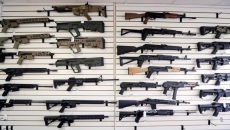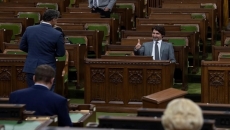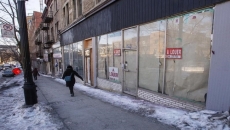Strong testing and contact-tracing measures are needed across Canada to prevent a resurgence of the COVID-19 pandemic, Prime Minister Justin Trudeau said Friday as he promised federal help for any provinces struggling to implement such measures.
The call for action, largely lacking specific details, came as one of the provinces hardest-hit by the virus reported a continued plateau in its rate of new cases and another shortfall in testing. Meanwhile, another province ramped up its economic recovery efforts by giving close-contact businesses like salons the green light to reopen.
"Taking strong, collaborative action to expand testing and contact tracing is important for both Canadians and businesses to have confidence that we're on the right foot," Trudeau said at a morning news conference. "They need to know that we have a co-ordinated approach to gradually reopen that is rooted in evidence, science and the ability to rapidly detect and control any future outbreaks."
Trudeau said the government hopes to recommend a smartphone app next month that could play a part in the contact tracing effort, saying similar efforts in countries such as Singapore and South Korea have been successful to date.
Ottawa is helping procure swabs and other key testing materials, he said, and is also able to provide thousands of staff to help make contact-tracing calls.
Trudeau noted some of those resources are already being deployed in Ontario, where testing has re-emerged as an issue amid stubbornly static COVID-19 case data.
Ministry of Health data shows the province currently has capacity to conduct 21,000 tests a day, but has been performing no more than half that number for days. Ontario's growth rate of new cases, meanwhile, has hovered between 1.5 and 1.9 per cent for 12 of the last 13 days, including Friday when the number of new diagnoses climbed 1.8 per cent.
The national picture is similar,with provinces and territories collectively testing less than half of the roughly 60,000 people Chief Public Health Officer Dr. Theresa Tam said should be the daily target.
Trudeau said some provinces have capacity to increase testing and contact-tracing efforts without federal aid.
One such province, New Brunswick, moved into the next phase of its economic revival on Friday by allowing hair stylists, tattoo parlours and other "close-contact" businesses to reopen their doors.
Premier Blaine Higgs also said residents could begin expanding their immediate social "bubbles" ahead of a planned increase in the number of people allowed in public gatherings set to take effect next week.
"You can now spend time with close friends and family members who you would normally see on a regular basis," Higgs said. "We are asking you to keep your circle of friends and family as small and reasonable as possible, especially if you have a vulnerable person in your family, or a child who attends daycare."
But more grim economic news continued to trickle in Friday, with national data showing retail sales plunged 10 per cent in March when widespread physical distancing measures first took effect. Statistics Canada said preliminary data indicates the decline will be even steeper in April, with early figures suggesting a decline of 15 per cent.
Canada has reported more than 81,700 cases of COVID-19, including nearly 6,200 deaths.






